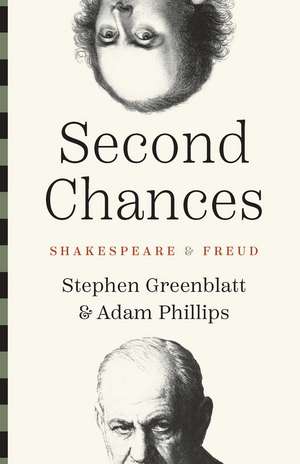Second Chances: Shakespeare and Freud
Autor Stephen Greenblatt, Adam Phillipsen Limba Engleză Hardback – 14 mai 2024
“A compellingly readable and intelligent book. . . . Both authors write with impressive energy.”—Rowan Williams, New Statesman
In this fresh investigation, Stephen Greenblatt and Adam Phillips explore how the second chance has been an essential feature of the literary imagination and a promise so central to our existence that we try to reproduce it again and again. Innumerable stories, from the Homeric epics to the New Testament, and from Oedipus Rex to Hamlet, explore the realization or failure of second chances—outcomes that depend on accident, acts of will, or fate. Such stories let us repeatedly rehearse the experience of loss and recovery: to know the joy that comes with a renewal of love and pleasure and to face the pain that comes with realizing that some damage can never be undone.
Through a series of illuminating readings, the authors show how Shakespeare was the supreme virtuoso of the second chance and Freud was its supreme interpreter. Both Shakespeare and Freud believed that we can narrate our life stories as tales of transformation, of momentous shifts, constrained by time and place but often still possible. Ranging from The Comedy of Errors to The Winter’s Tale, and from D. W. Winnicott to Marcel Proust, the authors challenge readers to imagine how, as Phillips writes, “it is the mending that matters.”
Preț: 150.96 lei
Nou
Puncte Express: 226
Preț estimativ în valută:
28.90€ • 31.40$ • 24.29£
28.90€ • 31.40$ • 24.29£
Carte disponibilă
Livrare economică 31 martie-14 aprilie
Livrare express 14-20 martie pentru 29.31 lei
Preluare comenzi: 021 569.72.76
Specificații
ISBN-13: 9780300276367
ISBN-10: 0300276362
Pagini: 232
Dimensiuni: 140 x 216 x 15 mm
Greutate: 0.4 kg
Editura: Yale University Press
Colecția Yale University Press
ISBN-10: 0300276362
Pagini: 232
Dimensiuni: 140 x 216 x 15 mm
Greutate: 0.4 kg
Editura: Yale University Press
Colecția Yale University Press
Recenzii
“A lively and provocative book.”—Alexander Leggatt, New York Review of Books
“A compellingly readable and intelligent book. . . . Both authors write with impressive energy.”—Rowan Williams, New Statesman
“In this scintillating collaboration between our leading Shakespearean and our most trenchant interpreter of Freud, the concept of the second chance keeps gathering momentum and reach. Second Chances is intellectually nimble and emotionally wise.”—Christopher Benfey, author of A Summer of Hummingbirds
“A fearless book. Greenblatt and Phillips speak to each other, and to us, with unflinching candor, wisdom, and tenderness about the possibility of renewing or remaking our lives. Second Chances stages a grand reckoning with fate and free will, fantasy and reality, and, above all, with the excitement and the terror of suddenly finding ourselves in a strange story, in a brave new world.”—Merve Emre, Wesleyan University
“This co-authored blend of candor and scholarship illuminates the faults and regrets, even the stupidities, of any life— along with the gift of redemption.”—Robert Pinsky, author of Proverbs of Limbo
“In the theme of the second chance, Stephen Greenblatt and Adam Phillips have discovered a marvelous entryway to both Shakespeare and Freud. This wonderful book is written clearly, with humanity and gusto.”—Mark Edmundson, University of Virginia
“In this endlessly surprising and revelatory book, Stephen Greenblatt and Adam Phillips show that thinking seriously about a ‘second chance’ is what could actually give us a second chance: a second chance at Shakespeare; a second chance at psychoanalysis; a second chance at love; even a second chance at life itself.”—Devorah Baum, author of On Marriage
“A compellingly readable and intelligent book. . . . Both authors write with impressive energy.”—Rowan Williams, New Statesman
“In this scintillating collaboration between our leading Shakespearean and our most trenchant interpreter of Freud, the concept of the second chance keeps gathering momentum and reach. Second Chances is intellectually nimble and emotionally wise.”—Christopher Benfey, author of A Summer of Hummingbirds
“A fearless book. Greenblatt and Phillips speak to each other, and to us, with unflinching candor, wisdom, and tenderness about the possibility of renewing or remaking our lives. Second Chances stages a grand reckoning with fate and free will, fantasy and reality, and, above all, with the excitement and the terror of suddenly finding ourselves in a strange story, in a brave new world.”—Merve Emre, Wesleyan University
“This co-authored blend of candor and scholarship illuminates the faults and regrets, even the stupidities, of any life— along with the gift of redemption.”—Robert Pinsky, author of Proverbs of Limbo
“In the theme of the second chance, Stephen Greenblatt and Adam Phillips have discovered a marvelous entryway to both Shakespeare and Freud. This wonderful book is written clearly, with humanity and gusto.”—Mark Edmundson, University of Virginia
“In this endlessly surprising and revelatory book, Stephen Greenblatt and Adam Phillips show that thinking seriously about a ‘second chance’ is what could actually give us a second chance: a second chance at Shakespeare; a second chance at psychoanalysis; a second chance at love; even a second chance at life itself.”—Devorah Baum, author of On Marriage
Notă biografică
Stephen Greenblatt is the John Cogan University Professor of the Humanities at Harvard University. His numerous books include The Swerve: How the World Became Modern, which won a Pulitzer Prize and a National Book Award. He is also the general editor of The Norton Shakespeare. He lives in Cambridge, MA. Adam Phillips, a psychoanalyst and essayist, is visiting professor of English at the University of York. He is general editor of the new Penguin Modern Classics translations of Sigmund Freud and the author of numerous books, including On Kindness; Missing Out: In Praise of the Unlived Life; and Becoming Freud. He lives in London, UK.
Descriere
A powerful exploration of the human capacity for renewal, as seen through Shakespeare and Freud
